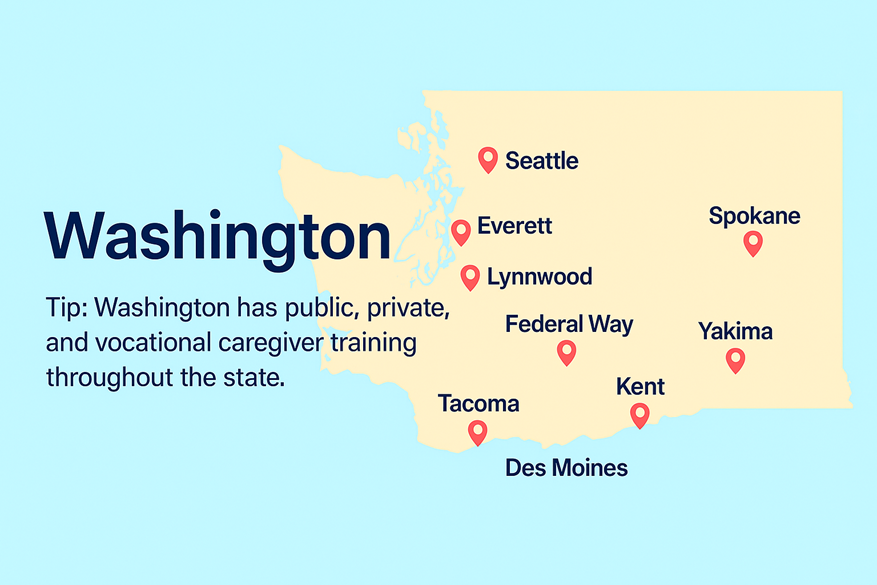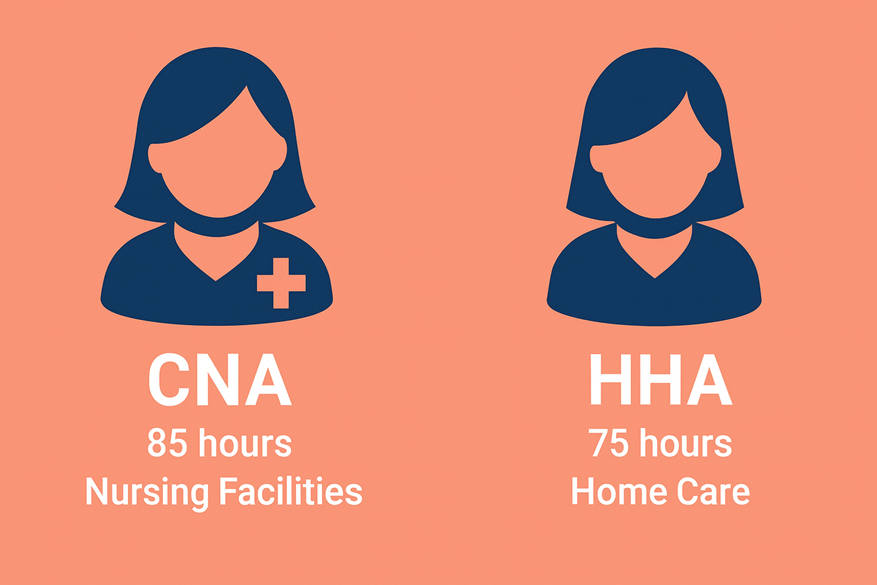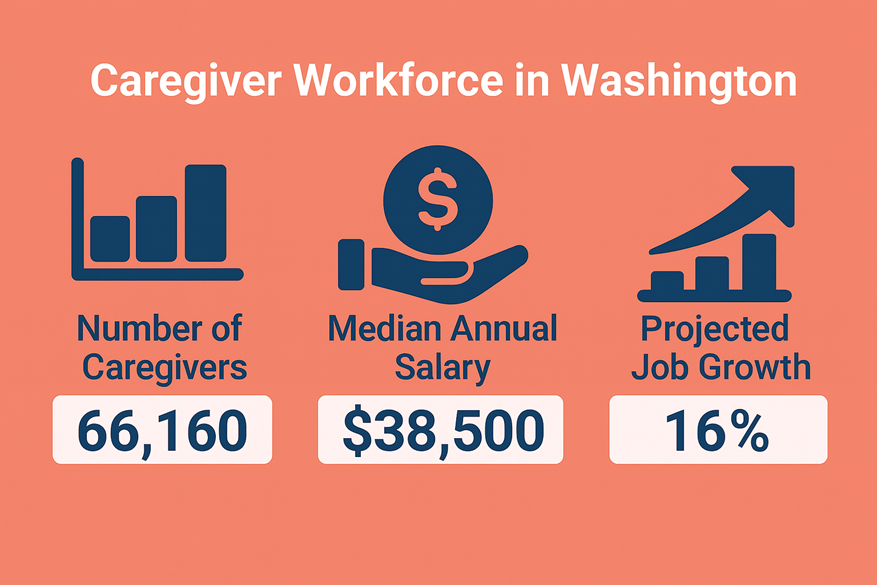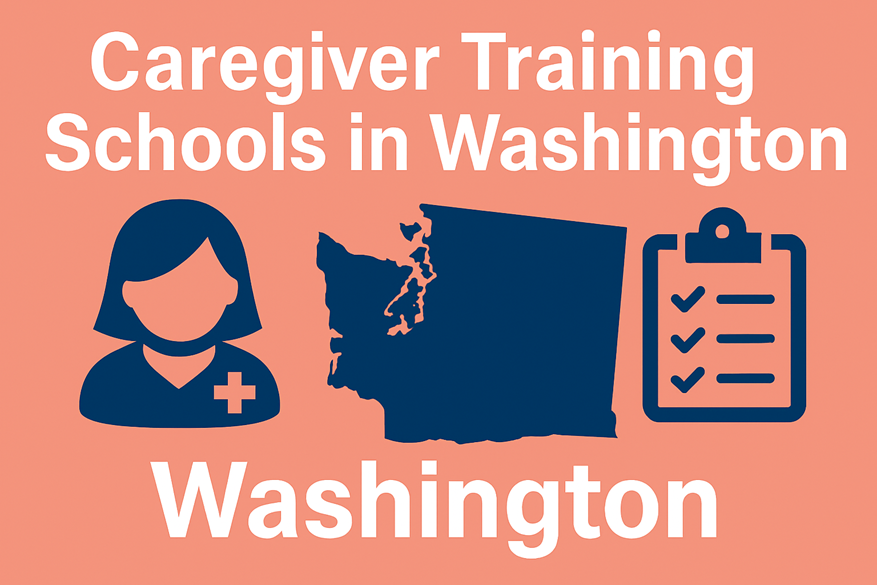If you’re thinking about starting a career as a caregiver in Washington, you’re in the right place. Whether you’re drawn to becoming a Certified Nursing Assistant (CNA) or a Home Health Aide (HHA), this guide will walk you through your options, schools, job outlook, and how to get certified. Washington has strong demand for trained caregivers, and with the right training, you can build a stable and rewarding career helping others.
Training Paths in Washington

In Washington, caregiver training typically falls under two categories: public/private colleges and vocational or career schools. Both options offer CNA training, and some also include HHA-related instruction.
Public & Private Colleges in Washington
Community and technical colleges across Washington offer CNA programs that are approved by the state’s Department of Health. These schools often follow a semester or quarterly schedule and may be more affordable for Washington residents. Some private colleges also offer CNA coursework, sometimes bundled with nursing prerequisites or other healthcare training.
Common cities where you’ll find these programs include Seattle, Tacoma, Spokane, and Everett.
Vocational & Career Schools in Washington
For faster training, vocational and career schools offer focused programs that often finish in 4 to 10 weeks. These schools cater to working adults and those wanting to enter the field quickly. While tuition can be higher per hour, the time savings and flexible schedules are appealing.
Vocational caregiver schools are spread across cities like Kent, Federal Way, Lynnwood, and Yakima.
Public & Private Colleges with CNA/HHA Programs
Vocational & Career Schools with Caregiver Training
CNA vs HHA in Washington: What’s the Difference?

In Washington, most caregivers start as CNAs. Home Health Aide (HHA) is not a separate license but is often part of the CNA’s job scope if working in home care.
Certified Nursing Assistant (CNA):
- Requires state-approved training and passing both written and skills exams.
- Must be listed on the Washington Nurse Aide Registry.
- Can work in nursing homes, assisted living facilities, hospitals, and home care settings.
- Training programs are usually 85 to 120 hours (state minimum is 85 hours).
- Requires a background check and fingerprinting.
Home Health Aide (HHA):
- Typically trained under the Home Care Aide (HCA) model if not a CNA.
- May complete a 75-hour training program and pass a state exam through the Department of Social and Health Services (DSHS).
- Works in home settings, assisting with daily living tasks and light medical support.
For those aiming for long-term caregiving careers, becoming a CNA gives more flexibility and higher earning potential. However, if you’re looking for entry-level home care work, the HCA/HHA path is also valid.
PCA = HCA in Washington
If you’re looking to become a PCA in Washington, you’ll actually want to look into the Home Care Aide (HCA) certification, which is regulated by the Department of Social and Health Services (DSHS) and the Department of Health (DOH).
Training & Certification for HCAs (or PCAs):
- Training Hours: 75 hours (includes core basic training and population-specific training)
- Exam: Must pass a state knowledge and skills exam
- Background Check: Required (including fingerprinting)
- Certification: Issued by Washington State DOH
- Job Setting: Mostly in-home care, assisting with activities of daily living (bathing, dressing, meals, etc.)
- Common Employers: Home care agencies, Medicaid-funded services, private households
Quick Comparison with CNA:
| Role | Training Hours | Certification | Job Setting |
|---|---|---|---|
| CNA | 85 hours | CNA license | Nursing facilities, hospitals |
| PCA (HCA in WA) | 75 hours | HCA license | In-home care |
Important Notes:
- Many people in Washington refer to PCAs informally, but officially the recognized title is Home Care Aide.
- Some employers may call the position PCA but will still require the HCA credential.
Helpful Links:
- HCA Certification Info (DSHS): https://www.dshs.wa.gov/altsa/home-care-aide-certification
- WA DOH Licensing Page: https://doh.wa.gov/licenses-permits-and-certificates/home-care-aide
Job Market Info in Washington (As of August 2025)

Washington continues to experience strong demand for caregivers, especially in urban centers and regions with aging populations. According to the latest data:
- CNA Average Salary:
$39,800 per year or around $19.00 per hour - HHA (or HCA) Average Salary:
$36,500 per year or around $17.50 per hour - Top Hiring Areas:
Seattle, Spokane, Vancouver, Everett, and Yakima - Growth Outlook:
Washington’s Department of Health and Employment Security Department expect caregiver jobs to grow by 16% to 20% through 2030, outpacing the average state job growth.
Many employers also offer bonuses, flexible schedules, or tuition reimbursement for CNA or HCA training, especially for in-home caregiving agencies.
Licensing & Certification: Washington CNA & HHA Steps
To become a CNA in Washington:
- Complete a DOH-approved CNA training program (minimum 85 hours, includes classroom and clinical practice).
- Submit an application to the Washington State Department of Health.
- Pass the NNAAP exam, which includes a written (or oral) portion and a hands-on skills test.
- Undergo a background check, including fingerprinting.
- Get listed on the Washington Nurse Aide Registry.
To become an HHA (Home Care Aide) in Washington:
- Take a 75-hour home care training course approved by DSHS.
- Pass the Washington State Home Care Aide Knowledge and Skills Exam.
- Submit your application to DSHS and complete fingerprint background checks.
- Receive a Home Care Aide Certification.
Note: CNAs who want to work in home settings may not need an HHA certification if their CNA is accepted by the employer. Check directly with agencies.
Pick a Path and Get Started
Becoming a CNA or HHA in Washington can open the door to a stable, fulfilling career in healthcare. Whether you choose a local community college or a fast-paced vocational school, the most important thing is to start. With high demand, flexible training options, and solid earning potential, caregiving is a great path for those who want to make a real difference.
Choose a school that fits your life and learning style, and don’t be afraid to reach out to them with questions. You’re not alone in this, there’s a whole caregiving community ready to welcome you.
Disclaimer
Training costs, program lengths, certification steps, and requirements can change. Always verify the latest information with the Washington State Department of Health, DSHS, or directly with the training provider before enrolling.
Sources
- Washington State Department of Health – CNA Certification:
https://doh.wa.gov/licenses-permits-and-certificates/nursing-assistants - Washington Nurse Aide Registry:
https://nursing.wa.gov - Department of Social and Health Services (DSHS) – HCA Certification:
https://www.dshs.wa.gov/altsa/home-care-aide-certification - Employment Security Department – Occupational Employment Statistics:
https://esd.wa.gov/labormarketinfo/occupations - Bureau of Labor Statistics – Washington Nurse Aide Data:
https://www.bls.gov/oes/current/oes_wa.htm - NACES – CNA Exam Testing in Washington:
https://www.nacesplus.com/

